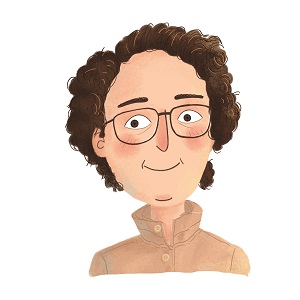“When a white person, a Westerner, appreciates Chinese culture and identifies with its philosophy so much that he or she thinks and behaves like a Chinese, then that person can be described as an egg – white on the outside and yellow on the inside. Conversely, a person can be referred to as a banana, yellow on the outside but white on the inside.” The author, who attended junior high school in the United States and later spent forty years of her life there, considered herself a banana until her daughter, American born and raised, said, ‘You’re not a banana. We are bananas.” We, meaning the author’s children. So, Fay Chou settled for half a banana, which gives title to this book.
Fay had always wanted to be a housewife. “You’re already a housewife. Now, go be something else,” her husband would say. And something else she did. Having moved to the United States shortly after graduating from university in Taiwan, Fay and her husband Rex embarked on capturing the American dream.
In Memoir of Half a Banana, Fay Chou recalls the story of her journey through life candidly, and opens up about the cultural differences between China and the U.S. in terms of schooling and culture, and which she prefers and why.
Having grown up with her grandparents, and living in mainland China with them until the age of 11, she feels a somewhat disconnect with her own parents when she is sent to live with them in Taiwan. Her parents appear to always doubt their own daughter, and are strict about what she is and is not allowed to do.
With her father working for the U.S. military in Taiwan, the family moves to the United States for three years while Fay is a teenager in junior high school. To get there, she, her mother and brothers travel by boat – a journey which ends up taking three months. While flying has become a very common way to travel across the world, it was interesting to read that not that long ago (in the 1960s), people were still crossing the Pacific Ocean by sea.
In the U.S., Fay, who didn’t speak any English at the time, makes every effort to embrace the culture and goes to extreme lengths to learn the language. She stays up late at night studying and even finds a local library she can borrow books from. Although she was learning quite a bit of English by watching television, her parents forbade it, claiming she was just being lazy. For the first three years in the U.S., Fay thrives. However the family soon moves back to Taiwan, where Fay completes high school and is accepted to the prestigious National Taiwan University. There she gets the opportunity to further her English studies and meets Rex when organizing a school performance, who becomes her husband.
Shortly after both graduated, Fay and Rex move to the U.S. where Fay embraces entrepreneurialism. She admits that she had always wanted a steady monthly income – where in China, a government job is coveted, in the U.S. starting one’s own business is aspiring. Rex, on the other hand, fell right in to the American culture and sought to help his friend and business partner expand businesses, none of which goes really well because once operations were up and running and the business established, the business partner consistently had his extended family join the company and take over operations. At one point, Fay and Rex even buy a Chinese restaurant having had no previous relevant experience, but they make it work.
All this entrepreneurialism and financial instability takes a toll on Fay and Rex’s marriage. Fay finds herself increasingly frustrated with some of Rex’s decisions, including a time when he decided he would move to Hong Kong to help the same business partner (but now in a different part of the world) and leave his wife to take care of their two young children and his own parents in California, in addition to running their own hat business.
To be practical and for financial reasons, Fay decides they will move to a different house where she can work from instead of having to rent out an office space. During the move, her mother-in-law reminds Fay to give Rex their address and home phone (this is before mobile phones were available) “or he won’t find us,” she insists. “Now, there’s a thought!”, Fay thinks.
After living apart for seven years, Fay and Rex try to reconcile and Fay goes to visit him in Hong Kong. Shortly after her arrival, her father asks that she go to Taiwan to look after him instead. Reluctantly, she does, and for the next fourteen months she takes good care of him, constantly attending to his every need. It is also during these fourteen months that she gets to know her father a little better, and he shares stories of the Second Sino-Japanese War. The relationship with her mother does not improve a lot during this period; but after her father’s passing, when Fay plans to visit Rex again in Hong Kong, her mother asks that she return to Taiwan to now look after her. Again, Fay cuts her travel to Hong Kong short.
In the chapter ‘Love, in Theory’, Fay explains how she does not feel endearing love for her parents but respects them, and is grateful for all they provided her. An unusual concept for an American audience, where it is not uncommon to cut family ties, including with parents, Fay does a phenomenal job in explaining how she feels towards her own parents and how the cultural differences play a key role. Similarly, in marriage, one does not always have to agree with their spouse or their business decisions, but tends to support them in their endeavors. This is more so in Asian than in Western cultures. And Fay portrays this with great clarity.






